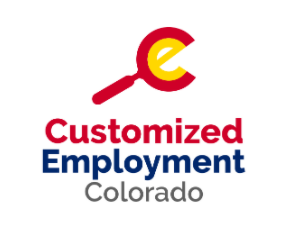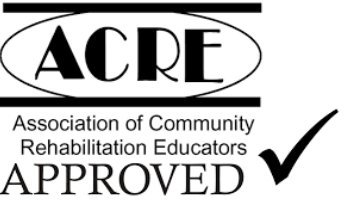Colorado Customized Employment: Performance Based Certification
Customized Employment (CE) is an employment process that uses a flexible blend of strategies, services, supports, and funds to facilitate employment outcomes for job seekers with complex needs through negotiated employment relationships. Customized employment individualizes the employment relationship between a job seeker and an employer in ways that meet the needs of both. Employment is consistent with the job seeker’s strengths, resources, priorities, concerns, abilities, capabilities, interests, and informed choice, as well as the identified business needs of the employer or the self-employment business chosen by the job seeker.
In 2017, a new ACRE curriculum group was formed to meld the existing ACRE competencies with the Essential Elements of Customized Employment developed jointly by the Workforce Innovation Technical Assistance Center (WINTAC) and the Vocational Rehabilitation Youth Technical Assistance Center (Y-TAC). The 2017 ACRE competencies with an Emphasis on Customized Employment (CE) have been approved by the ACRE Board. These competencies support Vocational Rehabilitation agencies and their contracted service providers in serving individuals needing Customized Employment, consistent with the requirements of the Workforce Innovation and Opportunities Act of 2014.

Providers of customized employment must have successfully completed an ACRE approved training with an emphasis in Customized Employment or a Customized Employment training approved by DVR and HCPF that meets Colorado’s 5 Core Competencies. Providers who seek to provide Customized Employment for job seekers in Colorado must provide CE services under the support of a qualified mentor for the first 6 months of service provision during and after this ACRE training. A qualified CE mentor may also sign off that the trainee is proficient with one or several service areas of Customized Employment (Discovery, Job development, and/or Systematic Instruction). This skills-based mentorship model requires supervision by a Qualified CE Mentor to support the competency of Customized Employment. Training and mentor support is specific to the Employment Specialist and not to the agency with which the individual is employed. Providers enrolled in a DVR approved or sponsored CE training are eligible for CE rates while providing services necessary while attending the ACRE approved training with mentor support.
Customized Employment Contents
- Competencies needed to be achieved within CE service provision with the support of said training and mentoring.
- Necessary qualifications of a Qualified CE Mentor, provided by the CE training entity, that will provide mentoring to ensure that the provider has sufficiently achieved adequate Customized Employment service provision with outlined competencies
- Qualifications of Qualified Vocational Rehabilitation QA Review Staff who will complete Annual QA reviews for practicing CE providers in the state of Colorado.
- Resources and information from various sources cited in references.
- All information, expectations, and guidance is intended to align with ACRE competencies with an emphasis on CE
- The Essential Elements of Customized Employment Universal Application guidance created by WINTAC and YTAC
Customized Employment Credentialing Requirements

Step One: Learn
Complete ACRE with an emphasis on Customized Employment Training that is approved by DVR to also include Mentorship for Customized Employment credentials.

Step Two: Demonstrate
Show knowledge and skills in all the aspects of the training, strengthened by a qualified Customized Employment Mentor for Customized Employment Service Delivery.

Step Three: Approval
Prior authorized Tier III Customized Employment services will be thoroughly reviewed by the DVR counselor utilizing the CE Essential Elements checklist to ensure that adequate provision of CE services occurred.

Step Four: Maintenance
Annual quality assurance review of Customized Employment services by a qualified CE QA reviewer will be conducted.

Step One: Learn
Providers enrolled in a DVR approved or sponsored CE training are eligible for CE rates while providing services necessary while attending the ACRE approved training with mentor support.
If you are a provider who has completed this training, you will meet the service provider requirements for Customized Employment rates for the provision of Supported Employment Job Search and Placement Services. To be made eligible to receive these rates, providers MUST contact Rachel Hoard.
For all Program Approved Service Agencies (PASA) with Home and Community Based (HCBS) Waivers, this training meets service provider requirements for Supported Employment services in the Supported Living Services (SLS) and Developmental Disabilities (DD) Waivers.


Step Two: Demonstrate
Providers interested in accessing Customized Employment rates will need to practice/perform Customized Employment (CE ) skills and processes under the mentorship of a qualified mentor. This will support the provider to adequately provide the identified CE service delivery area of Discovery and Planning, Job Development, and/or Systematic Instruction.
Being creative in how skills are performed is encouraged and accepted. Providers may perform on clients they are already working with, classmates, or any other creative ideas to ensure learning but limit barriers. If providers would like to be set up with a "learning partner" or job seeker to work with through DVR, this is also still acceptable and can be arranged (contact Rachel Hoard for details). Regular mentoring meetings to review and support adequate service delivery throughout the first 6 months of CE service delivery is required, or until mentor signs off that the trainee is proficient in the service delivery of identified area or areas of Customized Employment.
Mentors need to follow the WINTAC developed and Colorado adopted Customized Employment Mentoring Guidelines. Mentoring must be provided during the training process, as short and timely as possible. “A mentor is someone who has a genuine interest in overseeing and supporting the career and/or development of another person outside the normal supervision process. Mentors may help their mentees by: encouraging and empowering personal development. Helping to identify and correct gaps in relevant skills and knowledge.” Mentory needs to be a iterative and fluid process that is supportive rather than an oversight role.
Providers enrolled in a DVR approved or sponsored CE training are eligible for CE rates while providing services necessary while attending the ACRE approved training with mentor support. You MUST contact Rachel Hoard to be made eligible for these rates in DVR's billing management system.

Step Three: Approval
Invoices and progress notes received by DVR Counselors that were appropriately prior authorized for Tier III Customized Employment services, will be thoroughly reviewed by the DVR counselor utilizing a CE Essential Elements checklist to ensure that adequate provision of CE services occurred. If a counselor, upon review, determines that CE services did not meet the expectation of services outlined in the DVR fee schedule, payment will be denied. Providers will need to revise services provided to meet standards, and may resubmit at that time. The right to informed choice of the people DVR serves will be discussed throughout this process.

Step Four: Maintenance
Annual quality assurance (QA) review of Customized Employment services by a qualified CE QA reviewer may be conducted.
Further Information
Providers currently working under a mentor in their first 6 months of CE service provision must notify DVR of intention to complete training and mentorship as a new CE provider to be updated in DVR database as a CE provider. Please notify Rachel Hoard to have your vendor information updated.
Customized Employment Mentor Review
The information below contains benchmarks for mentors to provide feedback and support to new Customized Employment providers during a provider's first time and up to 6 months of initial Customized Employment practice completing each desired Customized Employment service area (Discovery and Planning, Job Development, and/or Systematic Instruction). This aligns with ACRE competencies with an emphasis on Customized Employment and "The Essential Elements of Customized Employment Universal Application" guidance created by WINTAC and YTAC.
Skills based mentoring for the first 6 months of service provision (minimum 1 meeting per month) is required to be eligible for Customized Employment services in the DVR fee schedule. Providers are eligible to receive Customized Employment rates during this 6 month learning period, to be actively providing the service under mentor support.

Discovery Mentor Support Areas
The following information on the drop-downs contain areas for mentors to provide feedback and support to new CE providers during a provider's first time providing CE services and up to 6 months of initial CE practice completing each desired CE service area (Discovery and Planning, Job Development, and/or Systematic Instruction). This aligns with ACRE competencies with an emphasis on CE and "The Essential Elements of Customized Employment Universal Application" guidance created by WINTAC and YTAC.
Mentoring for the first 6 months (or sooner if mentor signs off that the provider is proficient in the service provision of the identified CE service area) of service provision is required to be eligible for Tier III rates for CE services in the DVR fee schedule. Providers are eligible to receive Tier III rates during this 6 month learning period, to be actively providing the service under mentor support.
Mentoring must adhere to the Mentoring Guidelines listed later in this page.
Discovery and Planning is gathering information from the job seeker and the CE support team to determine the job seeker's interests, skills, and preferences related to potential employment that guide the development of a customized job. Using the information learned about an individual job seeker in Discovery to develop a plan, with job seeker approval, toward meaningful employment, determine a list of potential employers, and conduct an analysis of benefits. Qualified CE Mentors support and mentor in the following areas when an individual is receiving mentoring for Discovery service provision
- 1. Person-Centered Discovery Process
Performs designing and implementing a person-centered Discovery and planning process for job seekers who are seeking customized employment. Demonstrates development of an information gathering plan for a specific individual utilizing Customized Employment.
- 2. Gather Information
Gather information utilizing person-centered practices to include and not limited by:
- Conducting home visits or individual’s preferred location Identifying and interviewing family members, friends, direct support professionals and/or others who know the individual well
- Exploring cultural and social background Reviewing individual’s past records
- Observing the individual in daily routines and environments
- Observing surrounding community, employment locations, and available transportation options
- 3. Opportunities for New Activities
With a person centered approach, Identify, develop, and document opportunities for new activities that will inform the initial career planning process. Activities and locations identified should be chosen and agreed to by the person, and they may include :
- Task-based
- Discovery activities in both familiar and novel locations, individually developed for each person based on his/her personal interests, in multiple community settings
- Community mapping with the job seeker Informational interviews, job shadows, tours of businesses
- 4. Define Ideal Conditions
Define the job seeker's ideal conditions of employment, learning, characteristics, interests, preferences, contributions, task competence, and support needs.
- 5. Document
Document information about the job seeker’s interests, support needs including transportation, successful support strategies, local business areas identified and described, and performance with notes and pictures, (e.g., specific chores, responsibilities, and tasks are identified; specific hobbies, collections, and possessions of significance are identified; background information on each is gathered; any rituals and routines are identified and then explained in detail).
- 6. Descriptive Notes
Capture what is learned in descriptive notes that detail:
- The job seeker’s opinions about discussed tasks, skills, and business settings
- Needed environmental or job-task modifications for the person to succeed in his/her choices of employment settings
- The availability of community supports and transportation
- Any necessary assistive technology or other accommodations If they are currently working observing in their work setting
- 7. Person-Centered Profile
Utilize a person-centered profile format or template (training entity may provide examples) for recording and capturing relevant job seeker information from the Discovery process.
- 8. Integrated Information
Integrate relevant information into a comprehensive, narrative, non-evaluative document that provides sufficient information to assist the job seeker in planning a career development strategy. Additionally, demonstrate the development and facilitation of a CE planning meeting or other individual CE team strategy. All information needs to be accessible to the job seeker so they can truly plan next steps in their career development strategies.
- Results in the identification of targeted job tasks and a listing of specific potential employers
- Identify accommodations that may be required for employment success
- Identify the contributions an individual could bring to a customized employment position
- Gather images and information to develop visual resume Identify technology solutions (e.g., video, apps, and other platforms) the person served would like to use in representing themselves/when represented
- Identify local and national resources for benefits planning information, including strategies to increase financial literacy and personal income while maintaining eligibility for or replacing critical benefits, including healthcare, through the use of Social Security work incentives (e.g., Plans for Achieving Self-Support (PASS Plans), Impairment Related Work Expenses (IRWEs), Medicaid Buy-in, Continued Medicaid Eligibility (1619B), Student Earned Income Exclusion (SEIE), etc.)
- 9. Self-Employment
- Demonstrate how a CE plan might involve development of self-employment.
- Develop a strategy to determine feasibility for a self-employment approach.
- 10. Referrals
Demonstrate how to make referrals to appropriate local agencies, organizations, and networks based on individual career plans.
Customized Job Development Mentor Support Areas
Customized Job Development is:
- working collaboratively with the individual and the employer to negotiate a customized job;
- the provision of supports, and;
- the terms of employment that will match the individual's interests, skills, conditions necessary for success, and specific contributions, and will fill the unmet needs of an employer.
Qualified CE Mentors support and mentor in the following areas when an individual is receiving mentoring for Customized Job Development service provision.
- Marketing Plans
- Develop marketing plans and a system for organizing information on businesses and business contacts, including new area businesses and types of jobs available in the local area.
- Take the listed ACRE training with an emphasis on Customized Employment requirements and demonstrating adequate completion with mentor approval throughout all areas listed in this section.
- Effective Presentation
Demonstrate an Effective Presentation Designed for a Specific Audience:Develop and use marketing tools, including websites, employment brochures, fact sheets, cover letters to businesses, and business cards
- Plan and deliver presentations to groups of individuals and parents, advocacy groups, local civic organizations, service providers, and employers
- Participate in community business organizations (e.g., career centers, Chambers of Commerce, etc.)
- The CE job developer and the job seeker decide which representational materials they are going to use in their meetings with employers to highlight the job seeker’s positive work, skills, and personality
- Demonstrate Ability
Job Developer Will Demonstrate Ability To:
- Promote the agency as a resource to help businesses meet their hiring needs
- Explain the various ways employment agencies can support businesses to hire and train employees with disabilities, including creating customized positions
- Understand and articulate the features and benefits offered by both supported employment and customized employment
- Target messages to the audience, rather than offering only one generic presentation or brochure
- Use language, images, and video that highlight skills, abilities, and interests of job seekers, and respect the job seeker’s disclosure choices
- Use business appropriate terminology/language
- Share information about incentives to businesses when hiring job seekers with disabilities (e.g., tax credits, on-the-job training, diversity goals, etc.)
- Business Management
Utilize business management principles and/or process improvement methods, such as Lean or Six Sigma, to identify staffing, operational or workflow issues and other business needs.
Systematic Instruction Mentor Support Areas
Systematic Instruction or Workplace and Related Supports involves setting up ongoing post-placement supports and monitoring the employment relationship to ensure satisfaction of both the client and the employer. Qualified CE Mentors support and mentor in the following areas when an individual is receiving mentoring for Systematic Instruction service provision.
- 1. Negotiate
- Satisfactorily display ability to negotiate a comprehensive support plan with the employer that offers the new employee access to all the naturally existing features of the workplace. Utilize the employer/coworkers as primary trainers to the maximum extent possible. Offer the assistance of employment specialists/job coaches to provide additional support as needed.
- Job coach will take the listed ACRE training with an emphasis in Customized Employment requirements and demonstrate adequate completion with mentor approval throughout all remaining items in this section.
- 2. Inclusive Job
Job Coach will satisfactorily ensure the employee enters the job in the most inclusive manner possible:
- Maximize the employee’s hours on the job, including natural social times (breaks and lunch)
- Support worksite personnel in introducing the new employee to coworkers
- Maintain adherence to typical new employee orientation and training procedures
- 3. Transportation
Job coach identifies and assists to arrange transportation to and from work:
- Facilitate transportation to and from work (e.g., natural supports, public transportation, paid transportation agreements, etc.)
- Provide travel training as needed or connect employee with other resources for travel training
- Explore creative transportation solutions such as rideshare apps
- 4. Job Analysis
Complete a comprehensive job analysis:
- Identify strategies for creating/designing jobs that make use of integrated and natural supports
- List in sequence the duties and requirements of the job as well as the approximate time required to perform each task
- Describe job skills needed for an employee to perform the job functions
- Develop task analyses as required and appropriate
- Identify reinforcers that are natural to the work site (e.g., praise from a coworker or boss; taking a break)
- Create a specific task list based on the new employee’s skills and support needs
- 5. Accommodate
Demonstrate the development of individualized accommodations to support a specific individual in a specific CE position.
- 6. Universal Design
Adequately identify accommodations and universal design strategies that match the needs of the worker and employer:
- Identify commonly available and non-stigmatizing accommodations and modifications
- Develop individualized adaptations, including assistive technology, low-tech and no-tech solutions
- Teach the employee, and natural supports where appropriate, to use the accommodation strategy selected
- Evaluate the need for/appropriateness of accommodations on an ongoing basis
- 7. Job Training
Satisfactorily implement the job training and fading plans based on completed job analysis. Collect data on effectiveness and modify job training plan as needed. Approaches may include:
- Providing consultation on systematic instruction to the natural/typical trainer in a business
- Increasing support to or temporarily stepping in for the natural trainer
- Temporarily increasing the reinforcement schedule and then strategically fading when data indicates task mastery
- Identifying, accessing, and using additional technological supports as needed
- Adjusting or modifying the tasks or duties only when the employment specialist has provided best practice systematic instruction and data indicates mastery is not occurring
- 8. Social/Behavioral
Job Coach will adequately demonstrate approaches to help individuals meet social/behavioral expectations of the workplace culture:
- Identify cultural norms of the workplace
- Where needed, develop a behavior change approach that includes describing behaviors in measurable and observable terms, identifying antecedents and consequences, and assessing the communicative functions of behaviors
- Evaluate options before implementing behavioral interventions
- Design strategies to support individuals in demonstrating socially acceptable behaviors
- 9. Workplace Supports
Job Coach will satisfactorily demonstrate strategies for developing workplace supports:
- Explore workplace/culture for opportunities for natural supports and how to implement them
- Facilitate training of the employee by his/her coworkers wherever possible
- Model and facilitate supports that promote inclusion and good social interactions rather than those which may be stigmatizing or stereotyping
- Facilitate mentor relationships between the employee and his/her coworkers Incorporate fading strategies in all workplace training plans
- Systematically fade supports as task mastery occurs and natural workplace supports are established
- 10. Job Stability
Job Coach will adequately demonstrate ability to maximize employee job performance and social inclusion to achieve job stability:
- Develop strategies to increase employee productivity/efficiency
- Assist the employee in using self-management strategies Identify strategies to increase the employee’s tolerance to workplace changes, such as new or multiple supervisors, added job duties, scheduling adjustments, and coworker assignments
- Identify strategies to mitigate job stress and anxiety
- Build collaborative relationships with family members and other service providers involved in supporting the employee
- Understand and adequately implement methods for providing long-term support for individuals, families, employers, and coworkers, including possible funding resources for all employment outcomes, including wage employment, resource ownership, and self-employment
- Understand and adequately implement strategies to provide support to the employee and employer in the event of a job separation or termination
- 11. Ongoing Review
Job Coach displays ability to structure ongoing review of both the employee’s performance and their satisfaction with the job, to determine additional or different support needs and explore opportunities for career advancement:
- Identify/develop tools, resources, and strategies to determine employer’s satisfaction with employee performance
- Identify/develop tools, resources, and strategies to determine employee’s satisfaction with their employment
Customized Employment Mentoring Guidelines (WINTAC)
Mentorship during the first 6 months of CE provision or until mentor signs off that the trainee is proficient in the service delivery of identified area or areas of Customized Employment (can include during 40 hour ACRE training time) is intended to ensure success and uphold quality standards of CE. Mentoring must be provided by a Qualified Mentoring Consultant. Mentors not meeting these standards may be notified that they are no longer eligible to be a Qualified Mentoring Consultant. If a provider is working with a mentor who is not following the below standards please reach out to Rachel Hoard so that we may assist with the issue or provide a new mentor option.

Required Mentoring Components
Dynamic Process
Dynamic process in ‘real-time’ with on-going communication:
The CE mentoring process should be dynamic, where the mentor is closely shadowing (if possible), observing and providing feedback to the trainee regarding the discovery, job development and final job customization process including planning and systematic instruction. This involves frequent and on-going contact, review and feedback of the work as it’s being done, and can occur through a combination of in-person and distance mentoring approaches. Minimum of monthly meetings required.
Proactive
Mentoring is both reflective and proactive:
Regular and consistent feedback from the mentor to the trainee where the trainee is afforded the opportunity to reflect on the experience is a critical component of mentoring. Mentoring is proactive, allowing the mentor to make timely suggestions before issues arise to ensure the provision of quality CE services. What the trainee learns from the mentor can then be put into practice immediately.
Quality Assurance
Alignment with Colorado quality assurance strategies, resulting in longer term successful Competitive Integrated Employment (CIE) employment outcomes:
The mentoring process should directly align, be consistent with and be a part of an overall CE quality assurance strategy to ensure on-going delivery quality.
Mentoring should result in achieving successful long term customized employment placements that meet CIE criteria.
Qualified Customized Employment Mentoring & QA Reviewer Qualifications
Qualified Mentor Requirements
Education and Training Requirements
- Achieved completion of ACRE CE training and provided direct CE services following the CE Essential Elements for a minimum of 6 months.
- Successfully delivered CE services to an individual and achieved mentorship approval of satisfactory completion.
- One year of experience in job development with individuals who have significant disabilities
Characteristics
- Vision and values align with CE Be able to effectively provide feedback, including honest/positive guidance while holding provider staff accountable for their work
- Self-motivated, requiring limited supervision
- Excellent time management skills Responsive to emails, calls and letters within 2 business days
- Demonstrate effective communication skills, including technical writing
- Skilled at evaluating the performance of learner
- Capable and competent to deliver the intensive 1:1 mentoring training
- Flexibility in scheduling to accommodate the CE process
Qualified Vocational Rehabilitation QA Review Staff
Education and Training Requirements
- Completed ACRE training with emphasis on CE in all aspects of 40 CE competencies, through a CE trainer, who is following the CE essential elements
- One year of experience working with individuals who have significant disabilities
- Recommendation from Division of Vocational Rehabilitation management
Characteristics
- Vision and values align with CE
- Be able to effectively provide feedback, including honest, positive guidance while holding provider staff accountable for their work
- Self-motivated, requiring limited supervision
- Excellent time management skills
- Responsive to emails, calls, and letters
- Demonstrate effective communication skills, including technical writing
- Skilled at evaluating the performance of learner
Resources and Information
Approved Training
Available Colorado Approved CE Training and Mentorship Entities:
CO Office of Employment First website
Griffin Hammis Associates website
Marc Gold and Associates website
WISE Training Course: WOA 100 Series or WOA 200 Series (must also take Plan to Placement Course)
References
- Association of Community Rehabilitation Educators (ACRE)
- Michigan Vocational Rehabilitation certification guidelines and mentor guidelines
- ICF INTERNATIONAL “Customized Employment Competency Model”
- WINTAC, “Essential Elements of Customized Employment” and “Customized Employment Provider Checklist”
- Marc Gold & Associates
- Griffin-Hammis Associates
We would like to acknowledge the Colorado HCPF team for the help and support in developing this tool!
Contact DVR
In order to be eligible to receive Customized Employment rates, learn about approved training entities, concerns regarding a mentor, or looking to be connected with a learning partner, contact our vendor unit!